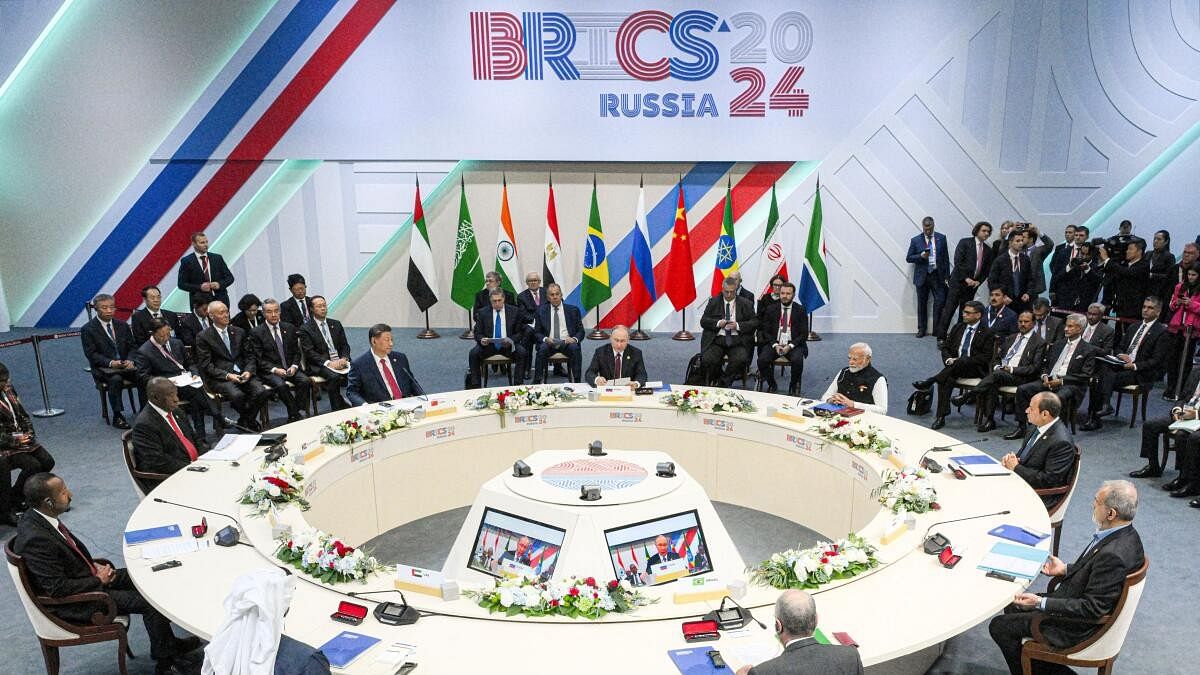
The BRICS leaders attend the summit in Kazan.
Credit: Reuters Photo
Kazan: BRICS nations on Wednesday agreed to strengthen trade and financial settlement in local currencies, study feasibility of an independent cross-border settlement and depositary infrastructure, and a BRICS reinsurance company.
The leaders also agreed to jointly develop the New Development Bank into a new type of multilateral development bank (MDB) in the 21st century and supported further expansion of the BRICS-led bank's membership.
The declaration issued after the 16th BRICS Summit here, said that BRICS members would explore the possibility for joint activities in the field of digital infrastructure to ensure the integrity, stability of the functioning and security of national segments of the Internet.
The leaders reiterated their commitment to enhancing financial co-operation within BRICS.
The BRICS leaders also expressed concerns over the fast-paced digitalization process of all aspects of human life in the 21st century and underscored the key role of data for development and the need to intensify the engagement within BRICS to address this issue.
The summit was attended by top leaders of BRICS nations, including Prime Minister Narendra Modi, Russian President Vladimir Putin and his Chinese counterpart Xi Jinping.
The leaders also reiterated their commitment to enhancing financial cooperation within BRICS.
"We recognise the widespread benefits of faster, low cost, more efficient, transparent, safe and inclusive cross-border payment instruments built upon the principle of minimizing trade barriers and non-discriminatory access.
"We welcome the use of local currencies in financial transactions between BRICS countries and their trading partners," it said.
The BRICS leaders encouraged strengthening of correspondent banking networks within BRICS and enabling settlements in local currencies in line with BRICS Cross-Border Payments Initiative (BCBPI), which is voluntary and non-binding.
BRICS, consisting of Brazil, Russia, India, China and South Africa initially, has now expanded with five additional members - Egypt, Ethiopia, Iran, Saudi Arabia, and the UAE.
The nations also acknowledged the importance of exploring the feasibility of connecting BRICS countries' financial markets infrastructure.
"We agree to discuss and study the feasibility of establishment of an independent cross-border settlement and depositary infrastructure, BRICS Clear, an initiative to complement the existing financial market infrastructure, as well as BRICS independent reinsurance capacity, including BRICS (Re) Insurance Company, with participation on a voluntary basis," it added.
The leaders tasked the BRICS Finance Ministers and Central Bank Governors, to continue discussion on the issue of local currencies, payment instruments and platforms.
"Concerned with the fast-paced digitalization process of all aspects of human life in the 21stcentury, we underscore the key role of data for development and the need to intensify the engagement within BRICS to address this issue," the declaration stated.
During their The BRICS leaders recognised that the use of blended finance is an effective way to mobilise private capital to finance infrastructure projects. It noted the important role of multilateral development banks and development finance institutions, in particular national development banks, in institutionally scaling up the use of blended finance and other instruments.
Recognising the role of the New Development Bank (NDB) in promoting infrastructure and sustainable development of its member countries, BRICS leaders supported improvement in corporate governance and operational effectiveness towards the fulfillment of the NDB's General Strategy for 2022-2026.
"We support the NDB in continuously expanding local currency financing and strengthening innovation in investment and financing tools....We agree to jointly develop the New Development Bank into a new type of MDB in the 21st century. ..
"We support the further expansion of NDB membership and expedited consideration of applications of BRICS countries in line with the NDB General Strategy and related policies," the declaration issued after three-day BRICS Summit said.
The BRICS leaders encouraged NDB to follow member-led and demand-driven principles, the employment of innovative financing mechanisms to mobilize financing from diversified sources, and in this regard, we acknowledge the initiative to create new investment platform to leverage the existing institutional infrastructure of the NDB to boost the investment flow into the countries of BRICS and the Global South mechanisms.
The leaders also welcomed the BRICS Interbank Cooperation Mechanism (ICM) focus on facilitating and expanding innovative financial practices and approaches for projects and programmes, including finding acceptable mechanisms of financing in local currencies and sought a continued dialogue between the ICM and the NDB.
Recognising the crucial role of BRICS in the process of improving the international monetary and financial system (IMFS), with a view to making it more responsive to the needs of all countries, the declaration noted the BRICS Chairship Research on improvement of the IMFS, which outlines core principles of security, independence, inclusion and sustainability crucial for economic and social prosperity.
The BRICS leaders reiterated their commitment to preventing and combating illicit financial flows, money laundering, terrorism financing, drug trafficking, corruption and the misuse of new technologies, including cryptocurrencies, for illegal and terrorist purposes.
With regard to high debt burden, the BRICS leaders recognised the need to address in an effective, comprehensive and systematic manner the debt vulnerabilities of both low and middle income countries.
The BRICS nations also called for reform of the Bretton Woods institutions, which includes increased representation of EMDCs in leadership positions to reflect the contribution of EMDCs to the global economy.
The leaders noted the need to further enhance intra-BRICS dialogue to unlock the enormous potential of ICTs and encourage policy exchanges and dialogues on Artificial Intelligence (AI)
The BRICS leaders resolved to further increase trust in e-commerce and ensure full-fledged protection of the rights of e-commerce parties, by intensifying cooperation in the realms of utilizing digital technologies for consumer rights protection, exploring online dispute resolution tools and creating enabling environment for businesses to enter global markets, exchanging views on the issue of small value product trade through the cross-border e-commerce.